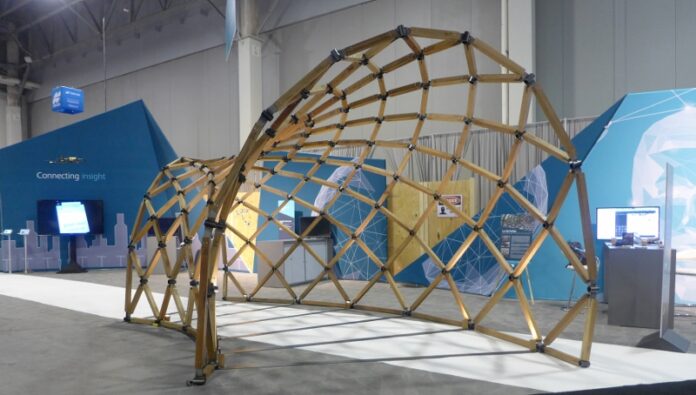
Joining more than 10,000 designers, artists, architects, engineers, and other industry professionals, the Virginia Tech School of Architecture + Design’s Center for Design Research demonstrated the future of making things at this year’s international Autodesk University in Las Vegas, Nevada this month.
Students from architecture, industrial design, and landscape architecture exhibited the second iteration of an experimental robotically fabricated grid shell, an extension of research surrounding computational design and fabrication workflows for use in the design and construction of complex spatial structures
Nathan King, assistant professor of architecture, leads the project, which expands research conducted during the design and construction of the Lo-Fab Pavilion. That project is a collaboration between MASS Design Group and the Virginia Tech Center for Design Research deployed on the Rose Kennedy Greenway as part of the Design Boston Biennial during the summer of 2015.
The pavilion, constructed using a state-of-the-art collaborative robotic work cell, demonstrates the efficacy of the use of short structural members to construct long span structures — a technique particularly suited to resource limited settings where construction material is in short supply.
The development of the experimental structure resulted in the creation of an automated design-to-structural optimization-to-robotic fabrication workflow that is helping expand the potential of design through novel ways of making. In addition, this research has led to the iterative collaborative development of the new Autodesk Dynamo-TORO plugin that enables the automated programming of industrial robots for use in art, architecture, design, and construction.
“The projects presented by Virginia Tech School of Architecture at this international event are indicative of the power of collaboration between industry, design practice, and academia,” King said. “It also represents a shifting paradigm whereby, our students, who are already skilled critical thinkers, are able to engage design technology in a sophisticated way to bring something new to the field.”
The project represents the third applied research project emerging from the newly developed Center for Design Research-Design Robotics Studio and expands the ongoing collaboration between MASS Design Group and the Center for Design Research under the auspices of the Commonwealth Consortium on Design and Health.


